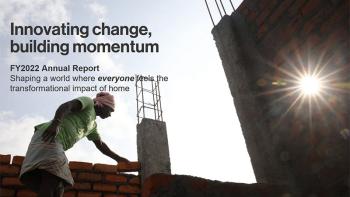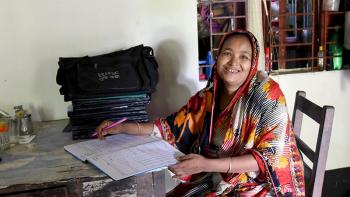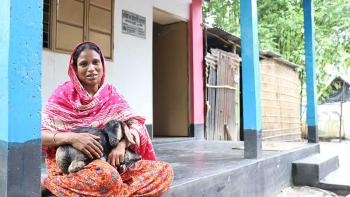Quick Facts
Individuals served in FY22: 4,165
- Through new construction – 230
- Through incremental building – 2,420
- Through repairs – 1,515
Volunteers engaged in FY22: 1
Other facts:
- Population: 170 million
- Life expectancy: 72 years
- Unemployment rate: 3.6 percent
- Population living below the poverty line: 18.7 percent
Source: World Factbook
Habitat for Humanity in Bangladesh
Since 1999, Habitat for Humanity Bangladesh has been working with low-income families to build strength, stability and self-reliance through shelter. Habitat Bangladesh currently operates in Dhaka, Chattogram, Mymensingh, Jamalpur, Khulna and Barishal districts. The programs include decent, affordable housing, clean water and safe sanitation, training in appropriate construction technology as well as disaster response and mitigation.
The housing need in Bangladesh
About 15 million people have slipped below the poverty line after losing their jobs and businesses during the COVID pandemic, the government think-tank Bangladesh Institute of Development Studies said in May 2023. An estimated 2,000 people move to Dhaka every day, displaced by rising sea levels and tropical storms. People move to urban centers in search of work or after losing their homes and livelihoods following disasters fueled by climate change. According to Bangladesh Bureau of Statistics’ 2022 census, 1.82 million people live in slums around the country. Three in four slum households live in one room, often lacking access to clean water, safe sanitation and waste management. Slum dwellers also face eviction threats as well as disaster risks from living in low-lying areas.
How Habitat addresses the need in Bangladesh
Habitat Bangladesh works with partners and volunteers to provide decent homes as a way out of poverty. Responding to disasters such as cyclones or storms has enabled Habitat to help Bangladeshi families rebuild more resilient homes. Improving communities’ access to clean water and safe sanitation along with raising hygiene standards lead to better attendance in school and greater economic productivity.
Decent, affordable housing
Future homeowners build core houses comprising one room, a toilet and a veranda with the option of expanding their living space in the future. Habitat Bangladesh provides technical support to families and training to construction workers in building or renovating homes.
Water, sanitation and hygiene
Habitat Bangladesh delivers inclusive water, sanitation and hygiene, or WASH interventions that are customized, affordable, sustainable and integrated into the overall housing and urban ecosystems. A community-driven process is followed for WASH interventions which includes information and knowledge management opportunities, contextually appropriate technologies and responsible management and governance of natural resources.
Disaster response and mitigation
Habitat helps disaster-affected families through the distribution of emergency shelter kits and transitional housing in the initial phase and provides technical support when reconstruction takes place.
Urban development and advocacy
Habitat Bangladesh has been working with urban slum communities to address issues such as a lack of safe and decent housing, inadequate WASH facilities, and fire and disaster risks. We are a key member of the Urban INGO Forum in Bangladesh that serves as a platform for sharing experience and knowledge in urban development to influence policies.
Volunteer engagement
Currently, the Global Village program is resuming region by region. Habitat aims to maintain the health and safety of our staff, volunteers, partners and the people we serve, while providing a high standard of service and support. Local volunteers continue to support the annual Habitat Young Leaders Build by raising awareness and funds and speaking up for housing needs.


